3 Section 1-3: Numbers and Pronunciation
1-3: Numbers and Pronunciation
 You will see several of the major vowel combinations in the German language in these numbers.
You will see several of the major vowel combinations in the German language in these numbers.
ei → pronounced like English “i”.
ie → pronounced like English “e”.
Why? Because when these two vowels go a’walking, the second does the talking.
Click the link to do some online listening practice with “ei” and “ie.”
https://www.germanzone.org/sounds-german-ei-ie/.
- eu → pronounced like the “oy” in the English word “toy.”
- ö → pronounced like the “ur” in the English word “turn” but without the r-sound.
- ü → pronounced like the “ew” in the English word “few” but with lips rounded and less of the w-sound.
There are also several consonants in these numbers that have different sounds from those in English.
- z → pronounced like the “ts” sound at the end of the English word “cats.”
- s → pronounced like an English “z” at the beginning of a word.
- v → pronounced like an English “f”.
- w → pronounced like an English “v”.
Ex. A: Aussprache. Practice each sound by saying the following words out loud. Refer to the pronunciation guide if you forget how they sound.
- ei → eins, zwei, drei, heißen, Bleistift, Kugelschreiber, Einstein
- ie → vier, sieben, Papier, Radiergummi
- eu → neun, Euro, Feuer, teuer
- ö → zwölf, Töchter, könnte
- ü → fünf, Stück, München
- z → zehn, zwölf, zwanzig
- s → sechs, sieben, Rucksack, singen
- v → vier, viel, von
- w → was, wie, wo, wohin, zwölf
Deutsche Musik! Want to practice numbers 1-10 with Mo-Do’s German hit song from the 90s? The lyrics are inside the video.
Numbers past 12 are similar to English. In English, we add –teen to the end of numbers 1-9. In German, we add –zehn to the end. Note a few minor spelling changes in the chart below.
13: drei + zehn = dreizehn
14: vier + zehn = vierzehn
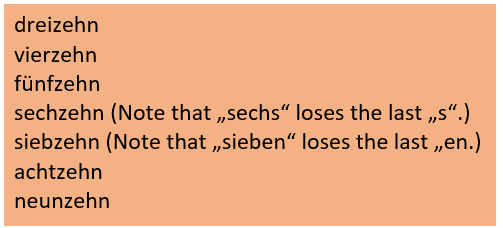
Listen to Light Bulb Languages pronounce numbers 1-20 below (https://www.lightbulblanguages.co.uk/)
Numbers above 19:
For two-digit numbers above nineteen, most German numbers add –zig, which is equivalent to the English suffix –ty with numbers. Note a few minor spelling changes in the chart below.
80: acht + zig = achtzig
90: neun + zig = neunzig
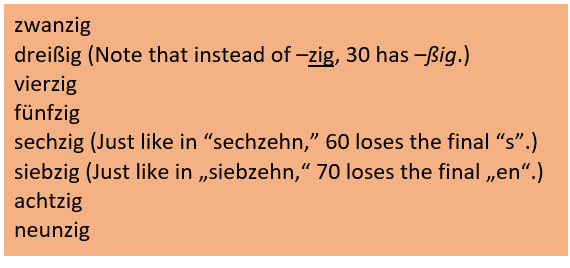
Pronunciation of 30 with its-ßig ending instead of –zig. (Courtesy of Wikimedia user kampy, Creative Commons Attribution-Share Alike 3.0 Unported.)
Compound numbers:
German compound numbers are constructed much like English numbers were hundreds of years ago.
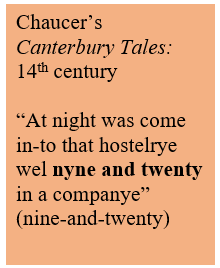
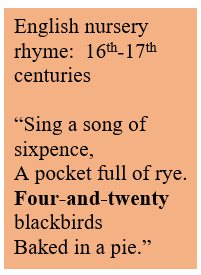
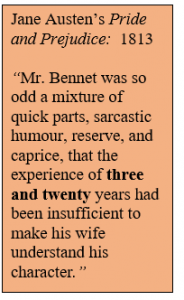
For 29, you would have “nine and twenty,” or neunundzwanzig in German.
(Audio courtesy of Wikimedia user joni, Creative Commons Attribution-Share Alike 3.0 Unported.)
21 → einundzwanzig (one and twenty)
22 → zweiundzwanzig (two and twenty)
23 → dreiundzwanzig (three and twenty)
…etc.
31 → einunddreißig (one and thirty)
32 → zweiunddreißig (two and thirty)
…etc.
Note that German does NOT have a space between the individual numbers. Write them all together as one long word.
To hear numbers 11-100 being pronounced, watch YourGermanTeacher’s video:
Saying Your Age:
To say how old you are, use the phrase Ich bin ______ plus your age.

![]()
QUICK LISTENING PRACTICE: Listen to Nora and Marla introducing themselves. Wie alt sind sie? Woher kommen sie? (Audio courtesy of AudioLingua.)
Watch Coffeebreak German’s video to see some examples of people saying how old they are.
Ex. C: Wie alt sind Sie? How old are you? Ask your classmates.
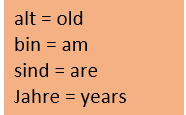
A: Wie alt sind Sie?
B: Ich bin ___________.
(Variation: Ich bin _____ Jahre alt.)
Video. Watch Easy German’s video to hear numbers 1-100 spoken aloud with examples.
Try Dr. Claudia Kost’s (University of Alberta) review of double-digit numbers:
Hundreds and thousands are expressed in German much like in English. You’ll need the words hundert (hundred) and tausend (thousand.)
[Audio courtesy of Wikimedia user kampy, Creative Commons Attribution-Share Alike 3.0 Unported.)
Once again, do not leave a space between individual numbers. Put them all together to make one long word.
4000: vier + tausend = viertausend
800: acht + hundert = achthundert
(Audio courtesy of Wikimedia user Frank C. Müller Creative Commons Attribution-Share Alike 4.0 International.)
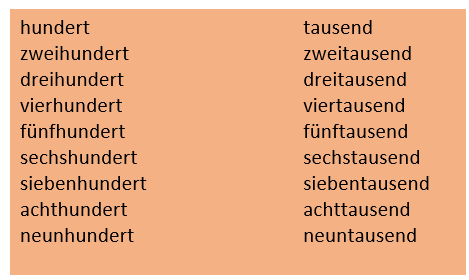
If you have a particularly long number, take it in steps.
Beispiel: 7529
Step 1: siebentausend
Step 2: fünfhundert
Step 3: neunundzwanzig
Now put it together: siebentausendfünfhundertneunundzwanzig
Like many German words, numbers are compound words without any spaces in between.
→ sieben|tausend|fünf|hundert|neun|und|zwanzig
Watch Graf Zahl (the Count) from German Sesamstrasse counting his money at the bank:
EXTRA LISTENING PRACTICE:
- Click on the link to Germanzone.org’s website to do the listening activity. Choose the number you hear read aloud: https://www.germanzone.org/horverstandnis-zahlen/.
- Click the link to do Germanzone.org’s online listening activity. You will hear several simple multiplication problems read aloud. Choose the answer that best corresponds to the answer: https://www.germanzone.org/horverstandnis-einmaleins/.
Beispiel: drei mal neun
→ 3 x 9 = 27 (siebenundzwanzig)
- Click the link to do Germanzone.org’s matching activity with numbers: https://www.germanzone.org/german-numbers-2/
- Wie viel Euro macht das? Click the link to do Germanzone.org’s activity using Euros: https://www.germanzone.org/german-numbers-1-wie-viel-euro/.
Larger Numbers
If you wish to make higher numbers, follow the pattern you see in English.
forty thousand→vierzigtausend
eighty-three thousand→dreiundachtzigtausend
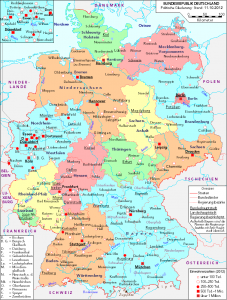
Deutschland hat über 83 Millionen Einwohner.
Listen to Max Giesinger’s song, 80 Millionen, to practice numbers.
In Germany, the comma and decimal point are switched.
|
Amerika |
Deutschland |
|
49,000 |
49.000 |
|
$36.99 |
€36,99 |
|
$4,999.99 |
€4.999,99 |
Reading out prices works a lot like in English:
$4.65→four dollars sixty-five cents OR four sixty-five.
€4,65→vier Euro fünfundsechzig (Cent) OR vier fünfundsechzig.

Ex. E: Wieviel kostet das? Using the items below and the prices, write a complete sentence to describe how much each item costs.
Beispiel:  €900.
€900.
→Der Computer kostet neunhundert Euro.
(Audio courtesy of Wikimedia user Jeuwre, Creative Commons Attribution-Share Alike 4.0 International.)
 €17,99 5.
€17,99 5.  €44,99
€44,99 €5,50 6.
€5,50 6.  €25
€25 €4,75 7.
€4,75 7.  €800,59
€800,59 €158 8.
€158 8.  €1,77
€1,77
To see a brief review on how to say how much something costs, watch Anja’s video.
KULTURECKE: Finally, check out Deutsch im Blick‘s video to see what it’s like going through the checkout counter at a German grocery store. Did you notice any differences from shopping in your own country? Wie viel kostet das?
(Used with permission from The University of Texas at Austin | coerll.utexas.edu.)
Ex. G: Beim Flohmarkt. Cut out pictures of classroom items and mark the back side of each with a price–however cheap or expensive you wish. One student will play the role of the customer (Kunde/Kundin). The other will be the salesperson (Verkäufer/Verkäuferin). A sample conversation might go like this.
- Kunde/Kundin: Guten Tag!
- Verkäufer/Verkäuferin: Guten Tag!
- Kunde/Kundin: Was ist das? (pointing to item)
- Verkäufer/Verkäuferin: Das ist der Bleistift.
- Kunde/Kundin: Wieviel kostet der Bleistift? (OR Wieviel kostet er?)
- Verkäufer/Verkäuferin: (Looks at price on back of item) Er kostet vierhundertfünfzig Euro achtundneunzig.
- Kunde/Kundin: Was?!! Das ist zu teuer!
- Verkäufer/Verkäuferin: Aber das ist George Washingtons Bleistift.
- Kunde/Kundin: George Washingtons Bleistift?!! Cool! (Hand salesperson the money.)
Ex. H: Dialog. Read the dialog that takes place in a store and answer the questions.
- A: Guten Tag.
- B: Guten Tag.
- A: Kann ich Ihnen helfen? (Can I help you?)
- B: Ja. Wieviel kostet der Stuhl?
- A: Der Stuhl? Achtzig Euro fünfzig.
- B: Und der Tisch? Wieviel kostet er?
- A: Der Tisch kostet zweihundert.
- B: Das ist aber teuer!
- Wieviel kostet der Stuhl?
- Wieviel kostet der Tisch?
- Wieviel kosten 4 Stühle?
- Wieviel kosten 2 Tische?

